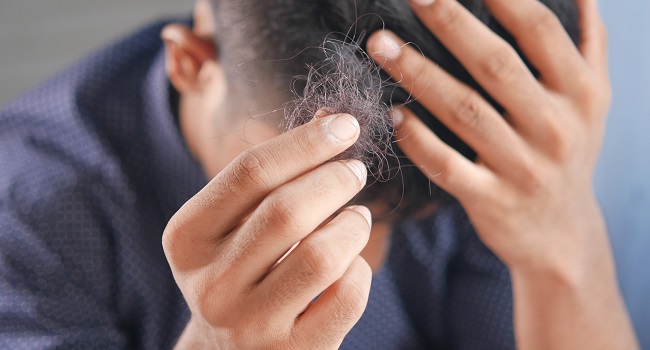Hair loss is a common and often distressing condition that can affect individuals of all ages and genders. While many people associate hair loss with aging, various health-related concerns can contribute to this phenomenon. Understanding the underlying causes is crucial for effective management and potential prevention. In this article, we delve into some distinct aspects of health-related hair loss, shedding light on the intricate connections between our overall well-being and the health of our hair.
Nutritional Deficiencies and Hair Health
One significant contributor to hair loss is nutritional deficiencies. The human body requires a balanced intake of vitamins and minerals for optimal functioning, and when these essential nutrients are lacking, the impact can extend to the health of our hair. Iron deficiency, for instance, is known to cause a type of hair loss called telogen effluvium, where the hair prematurely enters the resting phase of the growth cycle and subsequently falls out. Similarly, inadequate levels of vitamins such as Biotin (B7), Vitamin D, and Zinc can lead to brittle hair and increased shedding. To address and prevent nutritional deficiencies, maintaining a well-balanced diet rich in a variety of fruits, vegetables, lean proteins, and whole grains is crucial. Additionally, consulting with a healthcare professional for targeted supplementation can help restore the body’s nutrient levels and promote healthier hair growth.
Hormonal Imbalances and Hair Loss
Hormones play a pivotal role in regulating various bodily functions, including hair growth. Hormonal imbalances can arise due to factors such as age, pregnancy, childbirth, and certain medical conditions. Androgenetic alopecia, commonly known as male or female pattern baldness, is a hereditary condition influenced by hormonal changes, particularly the conversion of testosterone to dihydrotestosterone (DHT). This hormone has been linked to shrinking hair follicles, leading to thinner and shorter hair growth. Women may also experience hormonal fluctuations during menopause, which can result in hair thinning and loss. Managing hormonal imbalances may involve lifestyle modifications, hormone replacement therapy (HRT), or medications. Seeking guidance from healthcare professionals, such as endocrinologists or dermatologists, is crucial for accurate diagnosis and tailored treatment plans.
Stress and the Impact on Hair
In today’s fast-paced world, stress has become an almost ubiquitous part of life. However, chronic stress can have profound effects on our physical health, including the condition of our hair. Telogen effluvium, a type of hair loss mentioned earlier, can be triggered by significant stressors, such as surgery, illness, or emotional upheaval. Stress can also exacerbate existing hair conditions like alopecia areata, an autoimmune disorder where the immune system mistakenly attacks hair follicles. Managing stress through relaxation techniques, regular exercise, and mindfulness practices is essential for overall well-being and can positively impact hair health. In cases where stress-related hair loss persists, seeking support from mental health professionals can be instrumental in addressing the root causes and finding effective coping strategies.
Advanced Solutions
In recent years, advancements in the field of hair restoration have provided individuals with innovative solutions to address hair loss. From surgical procedures like hair transplantations to non-invasive treatments such as platelet-rich plasma (PRP) therapy, the options are diverse. Hair transplant procedures involve relocating hair follicles from areas of dense growth to areas experiencing thinning or balding, providing a long-lasting and natural-looking result. PRP therapy, on the other hand, harnesses the regenerative properties of platelets in the blood to stimulate hair follicles and promote hair growth.
These advanced techniques offer hope to those seeking effective and lasting solutions to hair loss. However, it is essential to approach such interventions with a well-informed mindset, considering factors like individual health, expectations, and potential side effects. Consulting with experienced professionals in the field of advanced hair restoration can guide individuals toward personalized treatments that align with their goals. That way it will contribute to the overall understanding and management of health-related hair loss.
Lifestyle Factors and Their Impact on Hair Health
Beyond the physiological aspects discussed earlier, lifestyle factors also play a crucial role in hair health. Habits such as smoking, excessive alcohol consumption, and poor sleep quality have been linked to increased hair loss. Smoking, for instance, can constrict blood vessels, reducing blood flow to the hair follicles and impeding their ability to function optimally. Similarly, inadequate sleep disrupts the body’s natural regeneration processes, including those related to hair growth. By adopting healthier lifestyle choices, individuals can positively influence their overall well-being, which, in turn, contributes to the vitality of their hair.

Genetic Predisposition and Personalized Care
Genetic predisposition is a significant factor in determining an individual’s susceptibility to certain types of hair loss. Understanding one’s family history can provide valuable insights into potential hair-related challenges. While genetics may influence the predisposition to conditions like androgenetic alopecia, personalized care plans can help manage and mitigate their impact. Dermatologists and healthcare professionals specializing in hair health can tailor strategies that combine genetic insights with targeted treatments, ensuring a more personalized and effective approach to combating hair loss.
In unraveling the complex tapestry of factors contributing to hair loss, it becomes evident that a holistic and personalized approach is key to effective management. Addressing nutritional deficiencies, hormonal imbalances, and stress alongside lifestyle modifications and advanced restoration techniques can significantly impact hair health. By understanding the interplay of these elements and seeking professional guidance, individuals can embark on a journey towards healthier, more resilient hair. Whether through lifestyle changes, advanced treatments, or a combination of both, the quest for optimal hair health is not only achievable but also an integral part of a broader commitment to overall well-being.


















